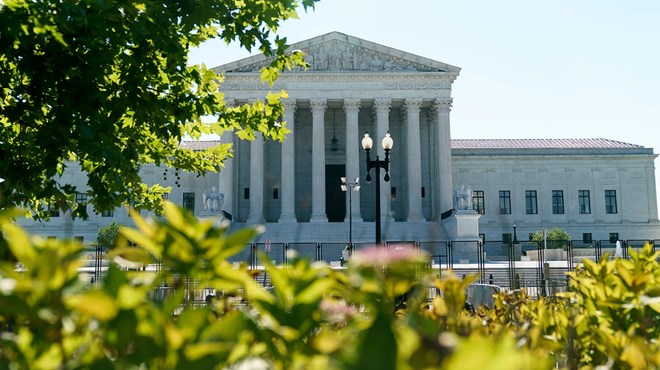
BY JOHN KRUZEL
Sunday August 7, 2022

A group of retired military heavyweights has urged the
Supreme Court to uphold affirmative action in higher education when the
justices review a legal challenge to race-conscious admissions policies at the
University of North Carolina (UNC) and Harvard University.
The former officers argued in court papers that allowing
colleges and service academies to consider race as a factor in admissions
decisions helps the U.S. military achieve its goal of cultivating a diverse
officer corps, which they said accrues benefits both within the ranks and in
overseas operations.
Prohibiting race-conscious admissions, on the other hand,
would threaten to undermine national security, the group argued in an amicus
brief signed by 35 former top military leaders, including the highest-ranking
military officers under former Presidents Trump, Obama, George W. Bush and
Clinton.
“History has shown that placing a diverse Armed Forces under
the command of homogenous leadership is a recipe for internal resentment,
discord, and violence,” the group wrote. “By contrast, units that are diverse across
all levels are more cohesive, collaborative, and effective.”
When the Supreme Court hears arguments in the case in
October, the focus will likely remain fixed on the interplay between diversity
goals, higher education and limits that the Constitution places on the use of
racial classifications to benefit minorities.
But as suggested by the former officers’ brief, as well as
scholarship connecting diversity and improved military performance, the
potential implications of the case could reach well beyond academia — perhaps
as far as the battlefield.
“Historically, diverse and inclusive armies outperform their
more exclusionary rivals in battlefield,” Jason Lyall, a professor of
government at Dartmouth College and author of the book “Divided Armies: Inequality
and Battlefield Performance in Modern War,” told The Hill.
“They typically record better casualty rates as well as
lower desertion and defection even when outnumbered,” he added. “Because of
their problem-solving skills, they are capable of more complex battlefield
maneuvers, and so are more lethal and resilient, than less inclusive enemies.”
The legal dispute at issue arose after a conservative-backed
group, Students for Fair Admissions (SFFA), sued UNC and Harvard over their use
of affirmative action in admissions decisions. The group accused the schools of
failing to pursue diversity goals through available race-neutral alternatives,
as required under Supreme Court precedent.
SFFA suffered defeat in the lower courts, where judges
rejected its arguments based on the landmark 2003 Grutter v. Bollinger decision
and related cases. In Grutter, the court ruled 5-4 that colleges may use race
as one factor in admissions decisions as a way to diversify student
populations.
In court papers, SFFA urged the justices to overturn
Grutter. That decision, it argued, defies the constitutional guarantee of equal
protection under the law and has led college admissions officers to engage in
“crude stereotyping” based on race.
SFFA, in its suit against Harvard, alleged that the school’s
admissions policy discriminates against Asian Americans. The group argued that
Harvard’s subjective “personal ratings” scores, which tended to reflect
cultural stereotypes, had made it harder for Asian Americans to be admitted,
compared to applicants of other races.
“Applicants who check the box for African American at
Harvard and UNC, for example, receive a preference because of their race
whether they grew up in poverty and went to failing schools, have parents who
were multimillionaire executives, spent their formative years in Europe, are
the direct descendants of slaves, or are second-generation immigrants from
Africa,” SFFA wrote, urging the justices to upend nearly two decades of
affirmative action precedent.
But the former military officers behind this week’s amicus
brief cautioned the justices against such a move. Overruling Grutter and
related Supreme Court precedent, they said, would make achieving the military’s
diversity goals more difficult and impair military cohesion and effectiveness.
An attorney for SFFA did not respond when asked to comment
on the potential national security implications of invalidating race-conscious
admissions policies in higher education.
The retired officers in their brief argued that diversity in
military leadership flows directly from diversity in higher education, with the
bulk of military officers hailing from service academies such as the Army’s
U.S. Military Academy in West Point, N.Y., or Reserve Officer Training Corps
programs housed at civilian universities.
“Diversity in the halls of academia directly affects
performance in the theaters of war,” they wrote.
They added that the demands of recent U.S. humanitarian
missions — which included deployments to Haiti, Somalia and Latin America —
underscore the need for diversity in the officer corps. That aim is no less
critical in elite special forces units such as the Navy SEALs, which currently
face a severe shortage of minority officers, they wrote.
“Life and death missions conducted by these units require
diverse skills, including foreign language competency and knowledge of other
cultures, along with the ability to collaborate and culturally empathize with
vastly different individuals,” they wrote.
Among the signatories to the brief were former Joint Chiefs
Chairmen Marine Gen. Joseph Dunford, Navy Adm. Michael Mullen, Air Force Gen.
Richard Myers and Army Gen. Henry Shelton.